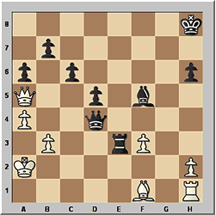The year 2009 promises to be one with a packed schedule for the organization. The federation expects to be re-admitted to FIDE (World Chess Organization), and in so doing, obtain international rating points for its players. In the meantime, the federation is continuing with its efforts to develop the game locally in schools.
In September-October, the federation is thinking of fielding a small team to participate in the Suriname Open chess tournament. The tournament is FIDE rated , and participants usually come from Caricom countries, Aruba, Curacao and the Netherlands. Over the years, International Masters (one rank below that of Grandmasters) have played in the tournament.
There is also a plan by the federation to introduce chess at the Teachers’ Training College, since its student teachers originate from various parts of Guyana.
Some reside and teach in the hinterland communi-ties, and this circumstance would present a fine opportunity for chess to be taught in those communities, and to develop the game there.
‘Chess via the Internet,’ a programme where chess will be available to players at Internet cafes will be introduced to the public later this year. By sourcing the software at a cafe, players could determine whether they want to play against the computer at a certain level, or whether they would prefer to study an opening, the middlegame or the endgame − or simply play with other chess players from around the world. This is an ambitious project that would need the cooperation of the cafe owners from around the country. Schoolchildren can improve the quality of their play by leaps and bounds using such a facility. A person knowing nothing of the game can also learn quickly using this feature.
Kasparov plays on the net sometimes; Nigel Short is a regular; Fischer played on the net and so do a number of other grandmasters.
Tomashevsky v Malakhov
The European Championship in Montenegro produced a final between Russian grandmasters − Evgeny Tomashevsky and Vladimir Malakhov. Tomashevsky won the first rapid game, but lost the second one. An Armageddon (sudden death) game was therefore required. Malakhov had the Black pieces and four minutes on his clock to finish the game. Tomashevsky had White and five minutes. But Black needed only a draw, to win the title. Malakhov managed to create a winning position, but blundered a Rook and lost the game.
Tomashevsky, E (2664) – Malakhov, V (2692)
10th EICC Playoff Budva MNE (4.3), 18.03.2009

Black has a forced mate: 48…Bb1+ 49.Kxb1 Qd1+ 50.Ka2 Qxb3+ 51.Ka1 Qd1+ 52.Ka2 Qc2+ 53.Ka1 Ra3#, but in the heat of the battle Malakhov throws it away: 48…Re1?? 49.Qxe1 Bg6 50.Qa1 and it’s all over. Black Resigns. 1-0.




